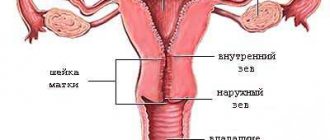Is the appearance of bloody discharge in an expectant mother a reason to consult a doctor or is this normal for early pregnancy?
Let's figure it out. Tatyana Vladimirovna Grigorieva, obstetrician-gynecologist at SM-Clinic (@smclinic), told Letidora readers about what the menstrual cycle is, as well as about menstruation during pregnancy. Tatyana Vladimirovna Grigorieva, obstetrician-gynecologist at SM-Clinic
Critical days: basics of female physiology
What do blood stains mean and how dangerous are they? To understand this, let’s look at the physiological processes that occur during “red days” and pregnancy.
If a girl does not become pregnant, “red days” begin: an unfertilized egg is released through the vagina with blood and endometrial particles. It is being replaced by a new one.
If conception occurs, the ovaries produce progesterone - it prevents the walls of the uterus from contracting and the endometrium with the fertilized egg from exfoliating. Consequently, the next menstruation does not occur - this is a sign of a normally developing pregnancy.
What effect does progesterone have on the mucous membranes of the uterus?
Progesterone is the most important hormone throughout pregnancy. It is involved in preparing the endometrium for implantation of a fertilized egg, fetal development, and prevents premature birth. The cause of bleeding from the vagina, including on days when a woman previously had menstruation, may be a lack of this hormone.
Hormonal bleeding left unattended can lead to spontaneous abortion.
However, in most cases, with timely treatment, it is possible to relieve the deficiency condition and minimize risks.
Regular and monthly periods during pregnancy: differences
Monthly and atypical bleeding after conception have distinctive characteristics. Using them, you can assess the seriousness of the situation and, if necessary, consult a doctor.
Here are the properties characteristic of menstrual blood:
- dark red;
- similar to venous;
- discharge is abundant and increasing;
- towards the end of menstruation, the discharge again becomes scanty until it stops.
But what criteria can be used to determine false first menstruation after conception:
- brown;
- similar to arterial blood;
- scanty, spotting;
- the profuseness depends on the cause - it may not increase, or it may turn from spotting into massive bleeding or not become more profuse;
- The duration of menstruation after conception is less than with classic monthly blood loss.
If a girl gets her period after conception, cramps appear and there is a pull in the lower abdomen and lower back, the uterus feels heavy and it seems like she wants to go to the toilet.
Can you have periods during pregnancy?
And again let's return to female physiology. The inside of the uterus is lined by the endometrium. If a girl has not conceived a baby, then during menstruation it, along with the unfertilized egg, is rejected every month and leaves the body. But during conception they are not rejected: the egg is fixed in the uterus, and the endometrium is needed for the development of the placenta - menstruation does not occur. Therefore, the expectant mother cannot have classical menstruation.
By the way, it is also incorrect to call these bleeding “red days” during pregnancy - these are precisely bleedings. They often require the intervention of a doctor, as they can be dangerous for the mother and fetus.
Bleeding due to lack of progesterone
One of the causes of bleeding may be a lack of the hormone progesterone in the mother's body. After ovulation, a corpus luteum appears in the ovary at the site of the follicle, which begins to produce progesterone. The corpus luteum is responsible for the production of this hormone until the formed placenta takes on this task. We already wrote above that a high level of progesterone is absolutely necessary to prevent rejection of the endometrium, and with it the embryo. If there is not enough of this hormone in the blood, the doctor will prescribe an additional dose (for example, drugs such as utrogest, duphaston or crinone), which in turn will help maintain the pregnancy. There is no clear answer to the question of how long to take these drugs. Some doctors advise not to stop taking it until the 12th week, others until the 8th or 9th week. Starting from the 12th week, there is no longer any need to take progesterone from the outside, since from this period progesterone is no longer produced by the corpus luteum and its production is taken over by the placenta.
When critical days are not scary
Let's list 3 situations when blood on an expectant mother's underwear does not signal danger.
The first situation is that conception did not occur immediately after sex. Sperm are active for another three days after they enter the female body. After the fusion of germ cells, the fertilized egg attaches to the wall of the uterus - this also takes time. It is now that menstruation can begin during early pregnancy. The girl is already pregnant, but does not even expect it, because the cycle began as scheduled.
But if you do a test after it, but it already shows two stripes, and in the next cycle there will be a delay. This situation is safe: the egg will be securely fixed in the uterus, the fetus will develop.
The second situation is implantation bleeding. Blood stains are almost invisible, do not look like menstrual blood - they are brown, pink or yellowish. Sometimes they are clearly visible. Implantation bleeding occurs when the fertilized egg attaches to the walls of the uterus. Such false periods occur during pregnancy in the early stages - in the first two weeks, and disappear within one to two days.
The third situation is when blood flows after intimate contact. This happens because the cells of the uterus change during pregnancy.
In any other situation, if menstruation occurs after conception, visit a gynecologist as soon as possible. Next, let's talk about when bleeding signals pathology.
Bleeding from the os of the uterus
The longer the pregnancy, the larger the placenta becomes and the more abundant the blood supply to the uterus itself, as well as its pharynx. At this point, sometimes careless sexual intercourse or simply a doctor’s examination is enough to damage small vessels in the os of the uterus. If bleeding occurs as a result of contact with the os of the uterus, then it is not severe and passes quickly. If there was no contact, then the bleeding may be caused by infections or be associated with a disease such as endometriosis.
Causes of menstruation during early pregnancy
We discussed two reasons above. Next, we will consider situations when atypical periods during pregnancy occur against the background of any disturbances in the body of the expectant mother.
Problems with hormonal levels
In the body of a future mother, hormones rule the roost. Incorrect functioning of the hormonal system can provoke menstruation during pregnancy in the form of spotting. Typically, a decreased level of progesterone or an increased level of male sex hormones is detected. In the first case, the girl’s chest becomes full, her stomach feels tight, she becomes irritable and drowsy, and feels unwell. In the second case, toxicosis passes, the breasts become the same as before pregnancy, and lower back pain appears. Hormonal therapy will help restore balance.
Embryo detachment
Accompanied by heavy bleeding. Detachment can be of varying degrees. The intensity of the discharge also depends on it. If it is minor, the woman is admitted to the hospital. In this case, there is a chance to save the baby.
Ectopic pregnancy and its complications
The fertilized egg is not attached to the wall of the uterus, but in the tube. In this situation, the baby has no chance, but the threat to the life of the pregnant woman is enormous. The pathology is characterized by a delay of several days, the test shows a positive result, toxicosis begins, and then bloody-brown discharge appears, which intensifies, and pain occurs in the abdomen and pelvis.
If the embryo grows, then in the 3rd - 4th week of pregnancy the tube may rupture, since it is not elastic. In this case, bleeding begins and urgent surgical intervention is necessary. Women who have suffered inflammatory diseases of the genitourinary system or infections are at risk.
Arbitrary termination of pregnancy
If there is a threat or a miscarriage has begun, it is also accompanied by atypical periods during early pregnancy. Hormonal imbalance, smoking, alcohol and drug use, heavy physical labor, active sports - all this increases the risk of miscarriage.
Intrauterine fetal death
When pregnancy fades, first the mother’s symptoms characteristic of an interesting situation disappear. Then a spot appears, which develops into heavy blood loss. The blood is scarlet. Lower abdomen hurts. The symptoms are similar to a miscarriage.
Risks of multiple pregnancies
If several eggs are fertilized, there is a high risk of death of one or more embryos. This is also accompanied by false periods during early pregnancy.
Diseases of the genital organs
The egg is simply not able to securely attach itself in the uterus. At risk are women with pathologies or tumors in the uterus, cervix, fibroids, cysts, adenomyosis.
Hydatidiform mole - complete or partial
This is a product of conception in which the embryo does not develop normally, and the chorionic villi grow in the form of fluid-filled blisters. In this case, embryonic tissue may be completely or partially absent. Massive bleeding begins. A characteristic feature is that the blood is dark in color and contains bubbles. The situation is serious, since in 20% of cases a hydatidiform mole degenerates into a malignant tumor, which invades healthy tissue and metastasizes.
Gestational trophoblastic disease
Diagnosed extremely rarely. A tumor forms in the uterus and contains abnormal fetal tissue. It is through the tumor that pregnancy is maintained.
Remember: if you are a healthy girl and your pregnancy is progressing normally, then you cannot have menstruation. If you notice that your mood changes sharply, there is a tug in the lower abdomen, nausea, you feel weak and drowsy, but you have “red days” on time, this is a reason to consult a gynecologist.
Bleeding when stopping contraceptives
Some women become pregnant despite taking birth control. In most cases, these are not “tricks” of the contraceptive, but its incorrect use. For example, a pill was missed or a gastrointestinal infection occurred while taking it. Diarrhea and vomiting may prevent absorption of the full dose of the active substance in the stomach and intestines. Sometimes, certain foods, such as grapefruit juice, can even interfere with the effectiveness of contraceptives. In these cases, a woman may become pregnant despite taking birth control pills. Stopping contraceptives causes bleeding, which is not actually menstruation.
False periods in the 2nd and 3rd trimesters
Bleeding also occurs after 20 weeks. They are usually due to the following reasons:
- Gynecological examination. If your doctor has examined your cervix, this may cause spotting. They will be weak and short-lived, and do not pose any danger;
- Placenta previa. If it is located low and blocks the exit from the uterine cavity, bleeding occurs. Pregnant women with breech presentation are usually hospitalized because massive bleeding may occur;
- Intimacy. The tissues of the cervix and vagina are very sensitive during pregnancy. Therefore, they are easy to injure. Therefore, gynecologists recommend having soft and calm sex, and leaving active and hard practices for later;
- Uterine rupture. A dangerous situation during childbirth, which happens extremely rarely. The woman in labor needs urgent medical care because there is a threat to her life;
- Placental abruption. If labor has not yet begun, and the placenta begins to tear away from the walls of the uterus, bleeding begins.
Bleeding can also occur during childbirth. When they begin, the uterus contracts and the cervix dilates. As a result, bleeding may occur.
conclusions
Pregnancy despite menstruation (if we consider it as a complete rejection of the endometrium) are incompatible. Thus, all stories about menstruation and pregnancy are myths . But at the beginning of pregnancy, bleeding is possible, which, although not menstruation, can coincide in time with it. Such bleeding occurs frequently, has various causes and often does not have any negative consequences. Therefore, women may mistake this bleeding for menstruation and claim that they had a period after becoming pregnant. IMPORTANT : the cause of any bleeding during pregnancy should be clarified at an appointment with a doctor, so as not to waste time and increase the chances of maintaining pregnancy in dangerous cases.
The danger of false periods during pregnancy
In some cases, blood loss can be life-threatening for the woman or child.
For example, if during an ectopic pregnancy and she is not given timely assistance, the woman may die from blood loss.
Any massive bleeding has the same potential threat. Due to the loss of a large volume of blood, for example, with placenta previa, a woman may lose consciousness, go into shock, and die.
During a frozen pregnancy , the woman’s body becomes intoxicated and the functioning of internal organs is disrupted. If freezing is not detected in time, the woman may die.
With a hydatidiform mole , a woman may experience a significant increase in blood pressure, proteinuria, edema, preeclampsia, and massive uterine bleeding. There is also a potential risk of the formation of luteal cysts in the ovaries and the malignant tumor chorionepithelioma.
Another danger is the risk of losing a child . If you get your period after conception, consult a doctor - this will give you a chance to save, carry and give birth to a healthy baby.
Indirect harm of blood loss
The girl begins to have “red days” and becomes convinced that conception has not happened. And continues to lead the usual way. Perhaps he smokes or does not refuse a glass of wine, works out in the gym or works in a hazardous industry, or eats irrationally. Meanwhile, she already has a new life. Pathological bleeding jeopardizes pregnancy, and bad habits only aggravate the situation.
Conclusion
As soon as you see the coveted two stripes on the test, be attentive to yourself and any changes in the body. Know: there should be no periods after conception. If you notice marks on your underwear that alarm you, play it safe - contact your obstetrician-gynecologist. This could save the life of you and your baby.
If you suspect that conception has occurred and you are having your period, take a test. It may show a positive result. Then you will be able to adjust your lifestyle taking into account the new situation: give up cigarettes and alcohol, do not lift weights, and include healthy foods in your diet. By doing so, you will give your baby a good start to health. A gynecologist will help minimize risks and maintain pregnancy.










